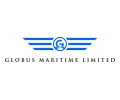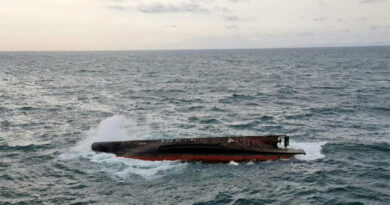Globus Maritime Limited Reports Financial Results for the Quarter Ended March 31, 2025

Globus Maritime Limited, a dry bulk shipping company, reported its unaudited consolidated operating and financial results for the quarter ended March 31, 2025.
Revenue
- $8.6 million in Q1 2025 compared to $7.7 million in Q1 2024
- Adjusted EBITDA
- $2 million in both Q1 2025 and Q1 2024
- Time Charter Equivalent
- $9,225 per day in Q1 2025 compared to $11,862 per day in Q1 2024
Current Fleet Profile
As of the date of this press release, Globus’ subsidiaries own and operate nine dry bulk carriers, consisting of six Kamsarmax and three Ultramax.
Current Fleet Deployment
All our vessels are currently operating on short-term time charters, we generally consider as spot charters, the charters that are below one year in duration and/or are chartered on index linked basis (“on spot”).
Management Commentary
The first quarter of 2025 was weak with the seasonally weak quarter further affected by geopolitical and economic factors around the world. However, we are now operating a much younger, more fuel-efficient fleet that allows us to keep our costs under control. We are continuing with our expansion and renewal efforts with the construction for our two Ultramaxes in Japan (scheduled for delivery in 2026) progressing smoothly.
We have a positive view of the medium- and long-term prospects of the industry. At this time we are preparing diligently for the various environmental regulations that are forthcoming, and we hope our modern and fuel-efficient fleet will be able to capitalize on the new regulatory environment.
We have an excellent relationship with our lenders which allows us to explore various financing options and tools to further expand and modernize our fleet. We are evaluating all possibilities that will help us maintain a robust balance sheet and a sustainable future.
The company successfully completed its first test voyage using biofuel, marking a significant milestone in its path toward reducing carbon emissions and aligning with future environmental regulations. The voyage was carried out involving the use of a sustainable biofuel blend, and the trial was carefully monitored to assess engine performance, fuel consumption, and overall operational impact, with no technical issues encountered during the journey.
The biofuel used in the trial voyage reduced lifecycle CO₂ emissions compared to conventional marine fuel, without requiring major engine modifications or retrofitting. Results from the test will set the stage for future voyages and help the company prepare for upcoming environmental legislation, including FuelEU Maritime and the IMO’s revised carbon intensity regulations.
Our Company remains committed to driving change in the maritime sector by investing in cleaner fuels, operational efficiency, and innovation.
Recent Developments
Sale of vessel
On February 4, 2025, the Company, through a wholly owned subsidiary, entered into an agreement to sell the 2007-built River Globe for a gross price of $8.55 million before commissions and expenses. The vessel was delivered to her new owners on March 17, 2025.
First Quarter of the Year 2025 compared to the First Quarter of the Year 2024
Net loss for the three-month period ended March 2025 amounted to $1.5 million or $0.07 basic and diluted loss per share based on 20,582,301 weighted average number of shares, compared to $0.3 million for the same period last year or $0.01 basic and diluted loss per share based on 20,582,301 weighted average number of shares.
Revenue
During the three-month period ended March 31, 2025, and 2024, our Voyage revenues reached $8.6 million and $7.6 million respectively. The 13% increase in Voyage revenues is mainly attributed to the increase from 6.7 average number of vessels during the three-month period ended March 31, 2024, to an average number of 9.8 vessels for the same period in 2025. This increase was counterbalanced by the decrease of the daily Time Charter Equivalent rate (TCE) from $11,862 per vessel per day for the three-month period ended March 31, 2024, to $9,225 per vessel per day during for the same period in 2025, corresponding to a decrease of 22%.
Adjusted EBITDA is included herein because it is a basis upon which we assess our financial performance and because we believe that it presents useful information to investors regarding a company’s ability to service and/or incur indebtedness and it is frequently used by securities analysts, investors and other interested parties in the evaluation of companies in our industry.
Adjusted EBITDA has limitations as an analytical tool, and you should not consider it in isolation, or as a substitute for analysis of our results as reported under IFRS. Some of these limitations are:
- Adjusted EBITDA does not reflect our cash expenditures or future requirements for capital expenditures or contractual commitments;
- Adjusted EBITDA does not reflect the interest expense or the cash requirements necessary to service interest or principal payments on our debt;
- Adjusted EBITDA does not reflect changes in or cash requirements for our working capital needs; and
- Other companies in our industry may calculate Adjusted EBITDA differently than we do, limiting its usefulness as a comparative measure.
Because of these limitations, Adjusted EBITDA should not be considered a measure of discretionary cash available to us to invest in the growth of our business.
The following table sets forth a reconciliation of Adjusted EBITDA to net (loss)/ income and net cash generated from operating activities for the periods presented:
Source: Globus Maritime Limited




